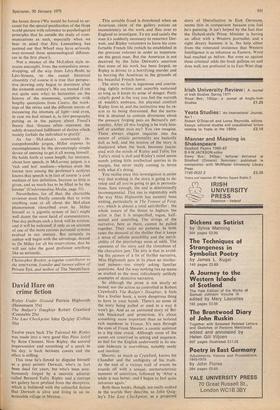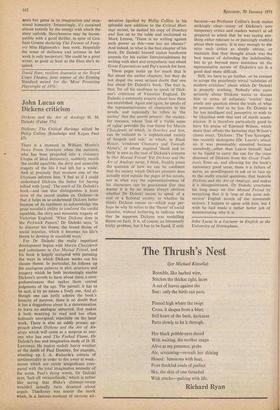David Hare on crime fiction
Ripley Under Ground Patricia Highsmith (Heinemann 35s) The Badger's Daughter Robert Crawford (Constable 25s)
Twelve years back The Talented Mr Ripley was made into a very good film Plein Soleil by Rene Clement. Now Ripley, the amoral impersonator and something of a spark in his day, is back betWeen covers and the effect is stifling.
This time he's forced to disguise himself as a great painter Derwatt, who's in fact been dead fOr years, but who's been post- humously forged by a neurotic admirer called Bernard Tufts. Ripley and a corrupt art gallery have profited from the deception, Which is bolstered with the colourful fiction that Derwatt is alive and living in an in- accessible village in Mexico. This amiable fraud is threatened when an American client of the gallery notices an inconsistency in the work and flies over to England to investigate. To try and satisfy the man it's suddenly necessary to resurrect Der- watt, and Ripley volunteers to leave his com- fortable French life (which he established in the previous volume) in order to imperson- ate the great man. But the American is not deceived by the false Derwatt's assertion that none of his work has been forged, so Ripley is driven to a horrifying murder and to burying the American in the grounds of his beautiful French home.
The story so far is ingenious and convin- cing, tightly written and superbly sustained as long as it keeps its sense of danger. Parti- cularly good is the way you feel the warmth of wealth's embrace, the physical comfort Ripley lives in, and the instinctive way he re- acts to its being threatened. But the narra- tive is strained to contain diversions about the pressure forging puts on Bernard's per- sonality. After all this forging is he truly him- self or another man etc? You can imagine. These always elegant inquiries into the nature of artistic personality are basically dull as hell, and the tension of the story is dissipated when the book becomes fascin- ated with the minds of Ripley and Tufts; for Tufts's mind is dull and Ripley's mind seems numb, jotting little intellectual queries in its margin, but never really coming to terms with what it's doing.
You realise once this investigation is under way that nothing in the story is going to de- velop and all you're going to get is permuta- tions. Sure enough, the end is determinedly inconsequential. This ties in regrettably with the way Miss Highsmith has recently been writing, particularly in The Tremor of Forg- ery, which is almost a total anti-thriller : the whole nature of the threat to Ingham the artist is that it is unspecified, vague, half- sensed and unsettling. The strings of the narrative, here as there, cannot be pulled together. They make no patterns. In both cases the demand of the thriller that it keeps a sense of infinite possibility and the inevit- ability of the psychology seem at odds. The openness of the story and the closedness of the characters jam. The pity is that in avoid- ing the patness of a lot of thriller narrative, Miss Highsmith puts in its place an intellec- tual patness—too simply asking familiar questions. And the way nothing ties up seems as studied .as the most ridiculously unlikely examples of detective narrative.
So although the prose is not nearly so honed, nor the action so controlled in Robert Crawford's 7'he Badger's Daughter, it feels like a livelier book, a more dangerous thing to have in your hands. There's no sense of the story being pulled or used in a way it won't go. And as an animated story of Bri- tish blackmail and protection, it's about something more important than an isolated rich murderer in France. It's seen through the eyes of Frank Shearer, a caustic assistant to a big time crook. Although some of the scenes are contrived in setting and sequence, its feel for the English underworld in its sea- side hideouts is marvellous, suitably seedy and resolute.
Shearer, as much as Crawford, knows his Chandler and the ambiguity of his trade. At the end of a• vicious trail of events he rounds off with a unique, uncharacteristic moment of contrition, followed by 'After a while it was better, and I began to feel quite inhuman again.'
Both these books, though, are really soaked in the worlds they describe, so John Quig- ley's The Last Checkpoint, as a projected
story of liberalisation in East Germany, seems thin in comparison because you feel he's guessing. It isn't helped by the fact that the Dubcek-style Prime Minister is having an affair with a Western journalist, and a right dreary business it is. No help either from the reiterated insistence that Western Intelligence is as inhuman as Eastern. Word had reached us before. But even so against these criminal odds the book gallops on and does well, not profound in its East-West diag- nosis but game in its imagination and occa- sional humanity. Interestingly, it's sustained almost entirely by the energy with which the story unfolds. Storylessness may be incom- patible with a good thriller, in spite of Gra- ham Greene declaring The Tremor of Forg- ery Miss Highsmith's best work. Hopefully the sense of dalliance and artiness in her work is only temporary. She could be a great writer, as good at least as the films she's in- spired.
David Hare, resident dramatist at the Royal Court Theatre, joint winner of the Evening Standard award for the 'Most Promising Playwright of 1970:


































 Previous page
Previous page